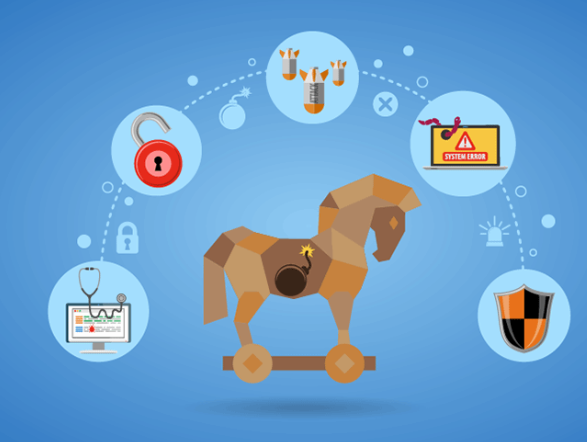Themida Trojan is a generic name for trojans that use the Themida packer to protect their applications against reverse engineering and initial detection. This detection does not refer to a specific malicious application and instead means that a potential infection is using the Themida packer.
Themida is a packer used by both legitimate and malicious actors, and it makes analyzing their products’ binaries much more difficult. It’s used by legitimate companies and businesses to make it difficult to reverse-engineer their products, while cybercriminals use it to conceal malicious activities from initial scans with anti-malware programs.
So a Themida Trojan detection can mean many things. But while it’s a generic detection, it should not be ignored because it’s likely that there is some kind of trojan present on your computer.
There are several types of trojans, and they can be programmed to perform different actions. Some trojans steal personal information (including passwords), and some trojans work as a backdoor for other malware (e.g. ransomware) to enter. Whatever kind of trojan it may be, it needs to be dealt with right away. If it’s a data-stealing trojan, it could steal your sensitive information, including login credentials. Stolen credentials would be used to access your accounts.
Trojans can also work as a backdoor for other malware to enter. A trojan can stay idle on a device until it receives a command to download a malicious payload. It could download and set up all kinds of malware, including file-encrypting ransomware.
Without an anti-malware program, trojans can be difficult to notice. They do show certain signs of being present but unless you’re familiar with them, they can easily be overlooked. Signs of a trojan include the computer suddenly becoming slow, programs crashing, and unknown processes appearing in your Task Manager. These processes may use a lot of your computer resources so they would be very noticeable. However, even if you were to notice a trojan infection, removing it manually would be too complicated.
However, even with anti-malware programs, detecting some trojans can be difficult. If a trojan uses the Themida packer, anti-malware programs may not initially detect it, which is why the best defense against malware is prevention. Developing good online habits can go a long way towards preventing infections like trojans.
Trojans usually end up on users’ computers when they open malicious email attachments, click on random links/ads, use torrents to download copyrighted content, etc. We highly recommend you familiarize yourself with how malware is distributed in order to prevent future infections.
How to remove Themida Trojan
In order to remove Themida Trojan, or even detect it, you will need an anti-malware program. Once it’s detected, the security program should be able to deal with it.
Because many trojans use the Themida packer, we cannot say which trojan specifically infected your computer. Thus, it’s difficult to say what, if any, damage it could have done. Nonetheless, as a precaution, we recommend that after you delete Themida Trojan, you change your passwords for all accounts you recently used the infected computer to access.
Offers
Download Removal Toolto scan for Themida TrojanUse our recommended removal tool to scan for Themida Trojan. Trial version of provides detection of computer threats like Themida Trojan and assists in its removal for FREE. You can delete detected registry entries, files and processes yourself or purchase a full version.
More information about SpyWarrior and Uninstall Instructions. Please review SpyWarrior EULA and Privacy Policy. SpyWarrior scanner is free. If it detects a malware, purchase its full version to remove it.

WiperSoft Review Details WiperSoft (www.wipersoft.com) is a security tool that provides real-time security from potential threats. Nowadays, many users tend to download free software from the Intern ...
Download|more


Is MacKeeper a virus? MacKeeper is not a virus, nor is it a scam. While there are various opinions about the program on the Internet, a lot of the people who so notoriously hate the program have neve ...
Download|more


While the creators of MalwareBytes anti-malware have not been in this business for long time, they make up for it with their enthusiastic approach. Statistic from such websites like CNET shows that th ...
Download|more
Site Disclaimer
2-remove-virus.com is not sponsored, owned, affiliated, or linked to malware developers or distributors that are referenced in this article. The article does not promote or endorse any type of malware. We aim at providing useful information that will help computer users to detect and eliminate the unwanted malicious programs from their computers. This can be done manually by following the instructions presented in the article or automatically by implementing the suggested anti-malware tools.
The article is only meant to be used for educational purposes. If you follow the instructions given in the article, you agree to be contracted by the disclaimer. We do not guarantee that the artcile will present you with a solution that removes the malign threats completely. Malware changes constantly, which is why, in some cases, it may be difficult to clean the computer fully by using only the manual removal instructions.

